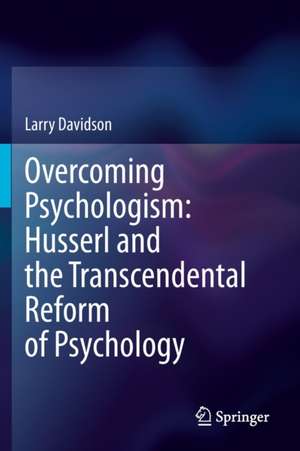Overcoming Psychologism: Husserl and the Transcendental Reform of Psychology
Autor Larry Davidsonen Limba Engleză Paperback – 22 noi 2021
The text covers Husserl’s definition of phenomenology as “descriptive psychology” in the Logical Investigations, rejecting the hybrid form of “phenomenological psychology” described in the lectures by that name, and endswith his proposal for a “fundamental refashioning” of psychology by situating it within the transcendental framework of The Crisis of European Sciences and Transcendental Phenomenology.
The Author argues for a re-grounding of psychology by virtue of a “return to positivity” after having performed the reduction to transcendental intersubjectivity. What results is a phenomenological approach to a transcendentally-grounded psychology which, while having returned to the life-world, no longer remains transcendentally naïve. A phenomenologically-grounded psychology thus empowers researchers, clinicians, and clients alike to engage in social actions that move the world closer to achieving social justice for all. This text appeals to students and researchers working in phenomenology and psychology.
| Toate formatele și edițiile | Preț | Express |
|---|---|---|
| Paperback (1) | 729.53 lei 6-8 săpt. | |
| Springer International Publishing – 22 noi 2021 | 729.53 lei 6-8 săpt. | |
| Hardback (1) | 735.53 lei 6-8 săpt. | |
| Springer International Publishing – 22 noi 2020 | 735.53 lei 6-8 săpt. |
Preț: 729.53 lei
Preț vechi: 889.68 lei
-18% Nou
Puncte Express: 1094
Preț estimativ în valută:
139.60€ • 149.28$ • 116.39£
139.60€ • 149.28$ • 116.39£
Carte tipărită la comandă
Livrare economică 17 aprilie-01 mai
Preluare comenzi: 021 569.72.76
Specificații
ISBN-13: 9783030599348
ISBN-10: 3030599345
Ilustrații: XIX, 334 p. 1 illus.
Dimensiuni: 155 x 235 mm
Greutate: 0.5 kg
Ediția:1st ed. 2021
Editura: Springer International Publishing
Colecția Springer
Locul publicării:Cham, Switzerland
ISBN-10: 3030599345
Ilustrații: XIX, 334 p. 1 illus.
Dimensiuni: 155 x 235 mm
Greutate: 0.5 kg
Ediția:1st ed. 2021
Editura: Springer International Publishing
Colecția Springer
Locul publicării:Cham, Switzerland
Cuprins
Introduction.- Chapter 1. Phenomenology as Descriptive Psychology.- Chapter 2. Phenomenology as Rigorous Philosophy.- Chapter 3. Phenomenology as Transcendental Philosophy.- Chapter 4. Phenomenological Psychology.- Chapter 5. Transcendental Psychologism.- Chapter 6. The Return From the Transcendental Psychological Idealism.- Chapter 7. Conclusion: Defining our Terms.
Recenzii
“Davidson’s book seems to be meant for those who work within the tension between human science and philosophy, that is, those who identify themselves as operating holistically within (and between) the two disciplines. … Davidson’s message to a natural scientific audience in psychology and psychiatry becomes an echo of Husserl’s ethical call to the European community in the late 1930s.” (Magnus Englander, Husserl Studies, Vol. 39 (3), 2023)
Notă biografică
Larry Davidson, Ph.D., is a Professor of Psychology in the Department of Psychiatry at the Yale School of Medicine, where he founded and directs the Program for Recovery and Community Health. He is the author or editor of seven other books and over 400 publications, as well as the recipient of numerous awards for his development of qualitative research methods in psychology and their use in understanding and promoting processes of recovery from serious mental illnesses.
Textul de pe ultima copertă
This book shows us how rather than abandoning psychology once he liberated phenomenology from the psychologism of the philosophy of arithmetic, Edmund Husserl remained concerned with the ways in which phenomenology held important implications for a radical reform of psychology throughout his intellectual career. The author fleshes out what such a radical reform actually entails, and proposes that it can only be accomplished by following the trail of the transcendental reduction described in Husserl’s later works. In order to appreciate the need for the transcendental even for psychology, the book tracks Husserl’s thinking on the nature of this relationship between phenomenology as a philosophy and psychology as a positive science as it evolved over time.
The text covers Husserl’s definition of phenomenology as “descriptive psychology” in the Logical Investigations, rejecting the hybrid form of “phenomenological psychology” described in the lectures by that name, and endswith his proposal for a “fundamental refashioning” of psychology by situating it within the transcendental framework of The Crisis of European Sciences and Transcendental Phenomenology.
The Author argues for a re-grounding of psychology by virtue of a “return to positivity” after having performed the reduction to transcendental intersubjectivity. What results is a phenomenological approach to a transcendentally-grounded psychology which, while having returned to the life-world, no longer remains transcendentally naïve. A phenomenologically-grounded psychology thus empowers researchers, clinicians, and clients alike to engage in social actions that move the world closer to achieving social justice for all. This text appeals to students and researchers working in phenomenology and psychology.
The text covers Husserl’s definition of phenomenology as “descriptive psychology” in the Logical Investigations, rejecting the hybrid form of “phenomenological psychology” described in the lectures by that name, and endswith his proposal for a “fundamental refashioning” of psychology by situating it within the transcendental framework of The Crisis of European Sciences and Transcendental Phenomenology.
The Author argues for a re-grounding of psychology by virtue of a “return to positivity” after having performed the reduction to transcendental intersubjectivity. What results is a phenomenological approach to a transcendentally-grounded psychology which, while having returned to the life-world, no longer remains transcendentally naïve. A phenomenologically-grounded psychology thus empowers researchers, clinicians, and clients alike to engage in social actions that move the world closer to achieving social justice for all. This text appeals to students and researchers working in phenomenology and psychology.
Caracteristici
Uniquely describes Husserl’s evolving views on the implications of phenomenology for reforming psychology Describes and illustrates the ways in which psychology can be “fundamentally refashioned” by being grounded in transcendental phenomenology Shows how transcendental phenomenology can infuse psychology with an understanding of the role of social, historical, political, and economic factors in shaping human experience
